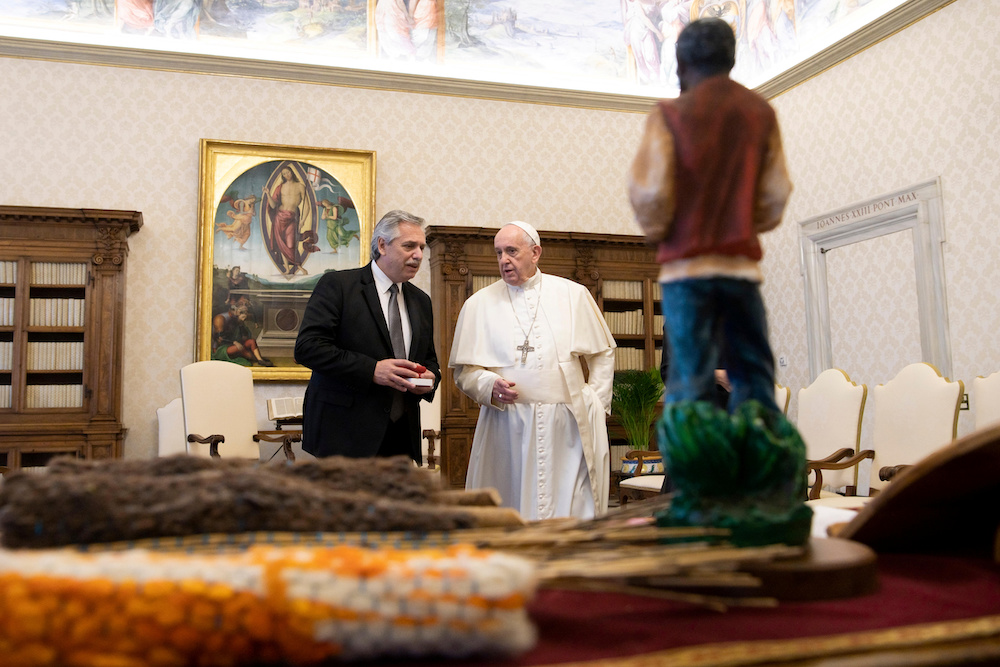
Pope Francis speaks with Argentine President Alberto Fernandez during a private audience at the Vatican Jan. 31, 2020. (CNS/Reuters/Vatican Media)
Pope Francis helped facilitate efforts to restructure the crippling debt load in his native Argentina Feb. 5, taking part in a Vatican conference that was the setting for discussions between the country's finance minister and the head of the International Monetary Fund (IMF).
In an unscheduled appearance at the event, which brought together dozens of officials from various world governments at the Pontifical Academy of Social Sciences, Francis also called on the IMF and other global institutions to pursue debt relief for countries across the world.
"We have to help developing countries to achieve debt sustainability, through coordinated policies which should finance debt and reschedule debt, in order to find a solution for the very indebted countries and to alleviate the suffering of people," he said.
"You have to remember your responsibility to aid the poorest countries," he told attendees at the summit, which also included the head of the World Bank; the finance ministers of Mexico, Paraguay, El Salvador and France; and Spain's deputy prime minister.
Although the one-day conference covered a range of global financial issues, most focus was on the appearance together of Argentine Minister Martin Guzman and IMF Managing Director Kristalina Georgieva-Kinova.
Argentina has a gross debt load of some $311 billion, including from previous IMF loans as well as those held by other public and private investors. In 202, the country is estimated to owe payments on $38.7 billion of the sum but is dealing with a steep recession, with inflation currently above 50%.
Advertisement
Guzman, who assumed office in December on appointment by new Argentine President Alberto Fernandez, has promised to present a debt sustainability analysis to the Argentinian Congress by the middle of the month, and then to make an offer to creditors in March.
Georgieva-Kinova met with Guzman for two and a half hours the night before the Vatican conference; she told journalists that the encounter had been "an opportunity to continue dialogue" on Argentina's debt issues and that she and the IMF want to see the country "get back up, grow and for work to return for the benefit of all Argentinians."
In a later speech to the conference, Georgieva-Kinova, who is Bulgarian, said she and the IMF are looking to help build "an economy that is at the service of people."
"We are strong-minded, but we are also soft-hearted," she said. "It is not your grandmother's IMF anymore."
In his own remarks, Guzman said there is "deep suffering" in Argentina because of the debt issues.
"In my view, we've been having very constructive discussions with the IMF," he said. "Every meeting, I sense that there is an increase in mutual understanding."
Among other speakers at the Feb. 5 event was Columbia University Professor Joseph Stiglitz, the 2001 recipient of the 2001 Nobel Prize in economics. He called for the United Nations to adopt a global bankruptcy process that would allow countries experiencing severe debt distress to seek protection from creditors.
Although the U.N. General Assembly adopted such measures in 2015, they never came into full effect because several countries, including the U.S., boycotted the process.
Eric LeCompte, the leader of Jubilee USA, a network of religious and development groups that argue for international debt relief, praised Stiglitz's call.
"Bankruptcy is a big deal," LeCompte, one of those attending the Vatican conference, told NCR. "If we had it, Argentina would have experienced limited crises, if any, and vulture funds wouldn't have been able to swoop in."
"As speakers today note, a global bankruptcy process is vital to address inequality and support countries to exit debt crisis and financial crisis," he said.
LeCompte also praised the Vatican for hosting the event.
"The Holy See continues a history of leadership focusing on the structural issues that cause poverty and inequality with this seminar," he said. "It's why this event pulls together the highest level of global decision makers to work on the biggest economic challenges of our time — economic challenges that impact all of our lives almost as much as the oxygen we breathe."
[Joshua J. McElwee (jmcelwee@ncronline.org) is NCR Vatican correspondent. Follow him on Twitter: @joshjmac.]








